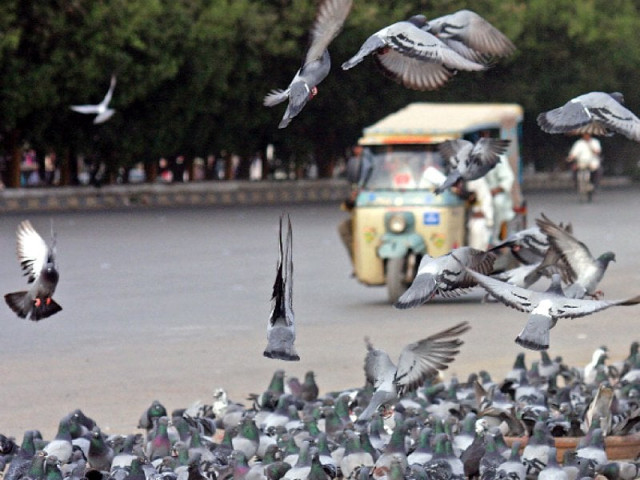A good bait: Wary residents feed birds, ease burdens
New Town Roundabout provides a feeding, bathing and resting place for birds, particularly pigeons.

The New Town Roundabout is famous as a spot where people come to feed flocks of birds. PHOTO: ATHAR KHAN/EXPRESS
Sana, a resident of Korangi, has been visiting the DIG office at Civic Centre for her missing brother’s case for a few months. However, before venturing inside the DIG’s office, she makes a brief stop at the roundabout to feed the birds.
“I stop here first thinking perhaps this time the DIG has something good to tell me,” she told The Express Tribune. “Maybe today he will tell me that some string leading to his location has been found.”

New Town Roundabout, commonly referred to as just ‘New Town’ by local minibus conductors and Qingqi drivers, is not a quiet, serene place surrounded by lush green lawns and ducks swimming in ponds. It is not even a sight anyone would give a second look to under normal circumstances. But for those who care, it is a place to slam their car brakes and feed the birds.
Large koondas, containing grains and millets, are placed on the junction. Grain is also spread on the ground for the birds’ convenience. On one side of a raised platform, lie separate smaller koondas containing dried roti, bread and other edibles; while on the other, pails of water are lined, tended every now and then by a man who wishes to remain anonymous.
Sitting nearby under the pedestrian bridge are two brothers, namely Sajid and Azhar. Surrounded by sacks of pearl millet (bajra), red rice, pulses, corn and wheat, the men sell these grains for Rs50 per kilogramme to those who wish to feed the birds.

“I have been selling grains here for the last three years,” said Sajid. “Before us, two young men took care of the birds.” When asked why he does this business, he said as a matter of fact: “I do it because it is a good deed.”
As people board and alight from buses and Qingqis in the backdrop, a man dressed in black empties the contents of a polythene bag in a koonda. “I come here frequently,” Rashid told The Express Tribune. “My wife was admitted for her hernia operation yesterday. I’m giving a sadqa for her good health.”
According to Sajid, different people come to feed the birds for different reasons. “Some believe they can compensate for their sins by feeding the voiceless. Others think it is better to feed to birds and animals than people.” He added that transgender people are not only frequent visitors of this place but are also more compassionate with birds than other visitors.
For many, taking care of birds may sound like a hobby. But to the brothers, it is a full time job that starts from eight in the morning and ends at five in the evening. “The police here also take care that no one captures these birds,” said Sajid, adding that the place belongs to the pigeons.
Published in The Express Tribune, January 2nd, 2015.



















COMMENTS
Comments are moderated and generally will be posted if they are on-topic and not abusive.
For more information, please see our Comments FAQ